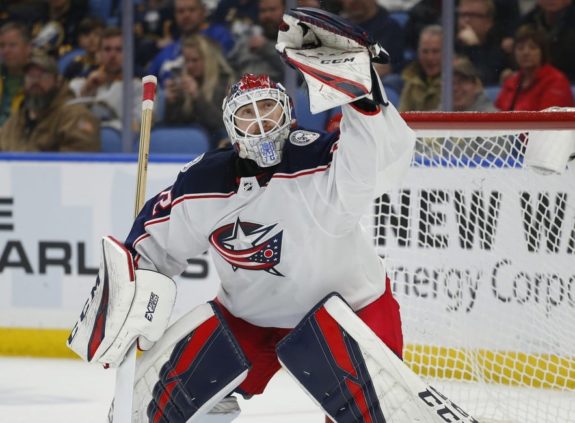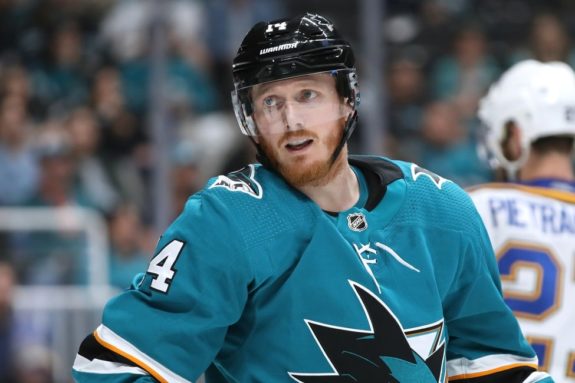The Columbus Blue Jackets have more to show for their second-round playoff exit than most may think.
After going all in by trading for Matt Duchene and Ryan Dzingel, the Blue Jackets shocked the Tampa Bay Lightning with a first-round sweep, but ultimately disappointed by losing to the Boston Bruins. It obviously didn’t help matters that they also lost stars Sergei Bobrovsky and Artemi Panarin to free agency on top of the above-mentioned trade-deadline acquisitions.

Nevertheless, the Blue Jackets aren’t in bad shape heading into 2019-20. Just the contrary. Here are three reasons why:
3. Bobrovsky Was Gone Anyway
The Blue Jackets reportedly knew Bobrovsky was leaving town as early as 2018. So, even though, as Bobrovsky tells it, they nonetheless tried to re-sign him, it can’t have come as a shock that the goalie signed elsewhere, with the Florida Panthers. In a way, consider it Bobrovsky’s parting gift to the franchise with which he broke out as an elite goalie.
Bobrovsky is obviously one of the top goalies in the game, but he’s also 31 and coming off an average regular season. In fact, for the second straight season, Bobrovsky’s numbers have gone down. They’re still respectable (37-24-1 with a 2.58 goals-against average and .913 save percentage), but far off the 41-17-5, 2.06 GAA and .931 save percentage that won him the Vezina Trophy in 2016-17. In other words, Bobrovsky has logically peaked.

Ultimately, the Panthers paid a premium for a glorified stop-gap measure until their 2019 first-round pick, Spencer Knight, is ready to take the reins. They’ll be giving Bobrovsky an average of $10 million for each of the next seven seasons, when there’s no telling if he’ll be able to maintain an elite level of play for even half that length.
Forget Bobrovsky’s stellar first round of the playoffs if it makes it easier. Don’t forget the fact that it was his first Blue Jackets series victory in four tries, though. The point is, however ordinary Bobrovsky has been in the playoffs during his career, he was just as much so during a very regular season in 2018-19. His successor can realistically reach the bar he just set and surpass it in the years to come.
Unlike the Panthers, the Blue Jackets may not have bridge in place between the present and their future, but they may not need one. It looks like they’ll be going with some combination of incumbent Joonas Korpisalo and newcomers Elvis Merzlikins and Veini Vehvilainen.
In a way, Korpisalo is ironically the biggest question mark of the bunch, because his stats line playing behind Bobrovsky over the last few seasons has been less than stellar. In contrast Merzlikins has been earning rave reviews for his play in Switzerland while Vehvilainen has done the same in Finland.
There’s obviously a great deal of uncertainty surrounding the Blue Jackets’ goaltending situation, but all that means is fans could just as easily end up pleasantly surprised. Had Bobrovsky re-signed, he was poised to disappoint. There’s a such thing as rebuilding on the fly, and the Blue Jackets are in a position to do so, from the net out.
2. Nyquist Is Far from Bad
Yes, Gustav Nyquist was somewhat underwhelming as general manager Jarmo Kekalainen’s top free-agent signee. In this case, underwhelming is just an impolite way of saying underrated, because Nyquist’s coming off his first 60-point season.
Granted, Nyquist’s 30 years old and it took him a while to get to 60. However, he did score 48 points in 57 games back in 2013-14. So, it’s hardly unprecedented for the Swede to get in a groove like he did last season.

Plus, even though his four-year, $22 million contract was criticized as being on the high side, it’s kind of the going rate for a perennial 50-point threat. Hell, his $5.5 million cap hit is just a $750,000 raise from what he had been making on average with his last contract. It’s hard to argue the Blue Jackets overpaid for the services of a legitimate top-six forward, here.
Where there may be some cause for the concern is who Nyquist could end up replacing in the lineup. He may be far from bad, but he’s admittedly far from Panarin, who obviously left for the New York Rangers. Panarin also enjoyed a career season, with 87 points. That’s 27 points that Nyquist will have a hard time making up, but maybe he won’t have to.
1. Who the Jackets Didn’t Have to Acquire
Yes, the Blue Jackets are out Panarin’s production from last year, and, yes, Nyquist would be hard-pressed to even come close to matching it. However, it’s not so far-fetched of a concept that the Blue Jackets accomplish the feat by committee.

They’ll presumably lean on players like Pierre-Luc Dubois and Josh Anderson to get them there, but both are on an upward trajectory from a production standpoint. That’s especially true of Dubois, who scored 48 points in his rookie season before upping the ante with 61 in 2018-19.
Assuming some of the other young guns like Oliver Bjorkstrand can take the next step in their development, it’s very realistic and even probable the Blue Jackets keep pace with what was the 12th-ranked offense in the league last season. Considering the defense is unchanged from the seventh-ranked corps that gave up 29.5 shots per game, the Blue Jackets are in decent shape.
It turns out one of the reasons the Blue Jackets could go for it was because the team was top-notch. Maybe they didn’t succeed, but they’ve got a few more kicks at the can at least, which is another: As one of the youngest teams in the NHL, they don’t need to look back at what could have been. It’s a matter of what still can be.
Sure, the Blue Jackets gave up a lot at last year’s trade deadline. However, sometimes it’s about the moves you don’t make or, in the Blue Jackets’ case this offseason, the moves you don’t need to make. They’ll be okay.